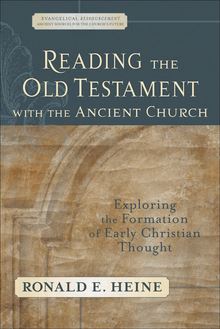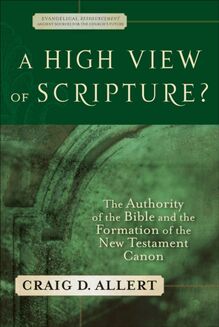High View of Scripture? (Evangelical Ressourcement) , livre ebook
104
pages
English
Ebooks
2007
Vous pourrez modifier la taille du texte de cet ouvrage
Obtenez un accès à la bibliothèque pour le consulter en ligne En savoir plus
Découvre YouScribe en t'inscrivant gratuitement
Découvre YouScribe en t'inscrivant gratuitement
104
pages
English
Ebooks
2007
Vous pourrez modifier la taille du texte de cet ouvrage
Obtenez un accès à la bibliothèque pour le consulter en ligne En savoir plus
Publié par
Date de parution
01 juin 2007
Nombre de lectures
0
EAN13
9781441201591
Langue
English
Publié par
Date de parution
01 juin 2007
Nombre de lectures
0
EAN13
9781441201591
Langue
English
A H IGH V IEW OF S CRIPTURE ?
EVANGELICAL RESSOURCEMENT ANCIENT SOURCES FOR THE CHURCH S FUTURE
D. H. Williams, series editor
The Evangelical Ressourcement series is designed to address the ways in which Christians may draw upon the thought and life of the early church to respond to the challenges facing today s church.
A H IGH V IEW OF S CRIPTURE ?
The Authority of the Bible and the Formation of the New Testament Canon
Craig D. Allert
2007 by Craig D. Allert
Published by Baker Academic a division of Baker Publishing Group P.O. Box 6287, Grand Rapids, MI 49516-6287 www.bakeracademic.com
Printed in the United States of America
All rights reserved. No part of this publication may be reproduced, stored in a retrieval system, or transmitted in any form or by any means-for example, electronic, photocopy, recording-without the prior written permission of the publisher. The only exception is brief quotations in printed reviews.
Library of Congress Cataloging-in-Publication Data
Allert, Craig D. A high view of Scripture? : the authority of the Bible and the formation of the New Testament canon / Craig D. Allert. p. cm. - (Evangelical ressourcement) Includes bibliographical references. ISBN 10: 0-8010-2778-0 (pbk.) ISBN 978-0-8010-2778-9 (pbk.) 1. Bible-Canon. 2. Bible-Evidences, authority, etc. 3. Bible-Inspiration. I. Title. BS465.A45 2007 220.12-dc22
2006032069
Unless otherwise indicated, Scripture quotations are from the New American Standard Bible , copyright 1960, 1962, 1963, 1968, 1971, 1972, 1973, 1975, 1977, 1995 by The Lockman Foundation. Used by permission.
Scripture quotations labeled KJV are from the King James Version of the Bible.
Scripture quotations labeled NIV are from the HOLY BIBLE, NEW INTERNATIONAL VERSION . NIV . Copyright 1973, 1978, 1984 by International Bible Society. Used by permission of Zondervan. All rights reserved.
Scripture quotations labeled Living Bible are from The Living Bible , copyright 1971. Used by permission of Tyndale House Publishers, Inc., Wheaton, Illinois 60189. All rights reserved.
Scripture quotations labeled NRSV are from the New Revised Standard Version of the Bible, copyright 1989, Division of Christian Education of the National Council of the Churches of Christ in the United States of America. Used by permission. All rights reserved.
C ontents
Abbreviations
Introduction
1. Evangelicals, Traditionalism, and the Bible
2. Introducing New Testament Canon Formation
3. Canon and Ecclesiology
4. A Closed Second-Century Canon?
5. Two Important Fourth-Century Lists
6. Inspiration and Inerrancy
Postscript
Appendix: The Fathers, Scripture, and Inspiration
Select Bibliography
A BBREVIATIONS ANF Ante-Nicene Fathers. Edited by Alexander Roberts and James Donaldson. Edinburgh: T T Clark, 1867-72. Reprinted Grand Rapids: Eerdmans, 1950-51. KJV King James Version = Authorized Version LCL Loeb Classical Library. Cambridge, MA: Harvard University Press, 1912- . LXX Septuagint NASB New American Standard Bible NIV New International Version NPNF 1 Nicene and Post-Nicene Fathers of the Church, Series 1. Edited by Philip Schaff. Grand Rapids: Eerdmans, 1983-87. NPNF 2 Nicene and Post-Nicene Fathers of the Church, Series 2. Edited by Philip Schaff and Henry Wace. Grand Rapids: Eerdmans, 1983-87. PG Patrologia graeca [= Patrologiae cursus completus: Series graeca]. Edited by J.-P. Migne. 162 vols. Paris, 1857-1886. NRSV New Revised Standard Version
I NTRODUCTION
I REMEMBER A STUDENT S complaint about the introduction of a book assigned for a class. The student expressed frustration that the author of the book spent so much time detailing what his book was not about that the student couldn t get a grasp of what the book actually was about. I tried to explain that the reason for this was perhaps that authors are painfully aware of other people s expectations of their work and of the things that they simply cannot cover, which leads to a bit of anxiety as it goes to press-in a way, authors are trying to protect themselves from what they see as unwarranted criticisms of their work. Although this did not alleviate the student s frustration, it did give him a sense of the issues and tensions faced by anyone who publishes a book.
With deference to that student, I am now faced with those same issues as I try to introduce the book you now have in your hands, and I realize that I must begin by indicating what this book is not about-a history of the formation of the New Testament canon. 1 This task has been accomplished in a number of excellent canon histories, the influence of which can be seen throughout the pages of this book. 2 This book is, rather, about investigating the implications of the formation of the New Testament canon on evangelical doctrines of Scripture.
Most evangelicals, particularly at the popular level, have what I call a dropped out of the sky understanding of the Bible. What I mean by this is that since the Bible is the primary source for evangelical faith and life, it is taken for granted as being always there and handed on to us as such. We give little thought to the question of why we have this particular collection. How, when, and why did this collection come into being, and why was it raised above all other documents of the early church? How was the authority of this collection recognized and appropriated in the early church? Did it act as the church s sole authority?
It is a significant lacuna that the understanding of the formation of the Bible is rarely broached by those who offer a high view of Scripture. A constant theme in what follows, therefore, is that a high view of Scripture should take account of the historical process that bequeathed to us the Bible, and that examination of this issue should actually precede an investigation into what the Bible says. Surely those who collected these documents into a canon had reasons for doing so; an investigation into the formation of the New Testament canon gives us a window into the church s thinking in this respect.
Rarely, however, do evangelical doctrines of Scripture take these historical issues seriously, assuming that a high view of Scripture starts with the doctrine of inspiration. 3 Consider, for example, one recent summary of the state of an evangelical doctrine of Scripture. Louis Hodges states, The starting point for the evangelical view of Scripture is the doctrine of inspiration. 4 According to Hodges, one issue that arises in forming a doctrine of Scripture is the relationship between the divine and the human in the authorship of the Bible. He argues that the evangelical must affirm both. Hodges then claims that there are two methodologies one may adopt with regard to tensions between the dual authorship of Scripture, that is, between the divine and human elements in Scripture. First, there is the inerrantist perspective, which works deductively from the self-teaching of Scripture . . . as well as the attributes of its divine author, and interpret[s] the phenomena associated with human authorship in light of Scripture s own claims. This method begins with certain theological assumptions and arranges the human phenomena within that grid. The other perspectives are those of the noninerrantists, who begin with their exegetical and historical understanding of the phenomena and work inductively toward a view of the nature of Scripture, even if it requires modifications of its self-teaching. For Hodges, the choice one makes between these two mutually exclusive methodologies is of momentous importance. Deductivists, who begin with the express claims of Scripture, inevitably end with a high view of its authority, and inductivists, who begin with the phenomena, conclude with a correspondingly lower view. 5
This is a fairly typical example of evangelical approaches to bibliology. In it a certain view of inspiration is argued as the high view of Scripture with the implication, often explicitly stated, that failure to hold this verbal plenary view of inspiration results in the propagation of a corresponding low view of Scripture. Essentially what has happened is that the definition of a high view of Scripture has simply become synonymous with the verbal plenary doctrine of Scripture. Its adherents see this as the only possible high view of Scripture. And since evangelicals traditionally hold a high view of Scripture, all evangelicals are virtually locked into this view for fear of espousing the dreaded low view of Scripture.
The problem here is not that evangelicals have a high view of Scripture but rather that a high view of Scripture has been usurped by verbal plenary theorists-the determination of what is high and what is low comes from them. The difference between a high and low view of Scripture has been reduced to the difference between what the Bible says or teaches (high view) and what the Bible is or its phenomena are (low view)-yet surely what the Bible is has much importance for what the Bible says , and a high view needs to take this into consideration. When it comes to understanding what the Bible is , evangelicals like Hodges (above) have usually asserted the divine authorship of Scripture while recognizing the human aspect. But when it comes to actually expressing what the Bible is , the divinity of Scripture has virtually eclipsed the humanity, and concerns about the process of canonicity are thus implicitly moot. We see this in Hodges s claim that the deductivist works from the attributes of its divine author and hence interprets in light of Scripture s own claims. The assumption at work here is that if the Bible is the very word of God to humanity, surely concern about what it says should overwhelm any concern about the process of how it came into the church s hands.
I am not here denying the inspiration of the Bible, but rather I am arguing that we evangelicals have come close to deifying this collection of texts with little to no understanding of how they



